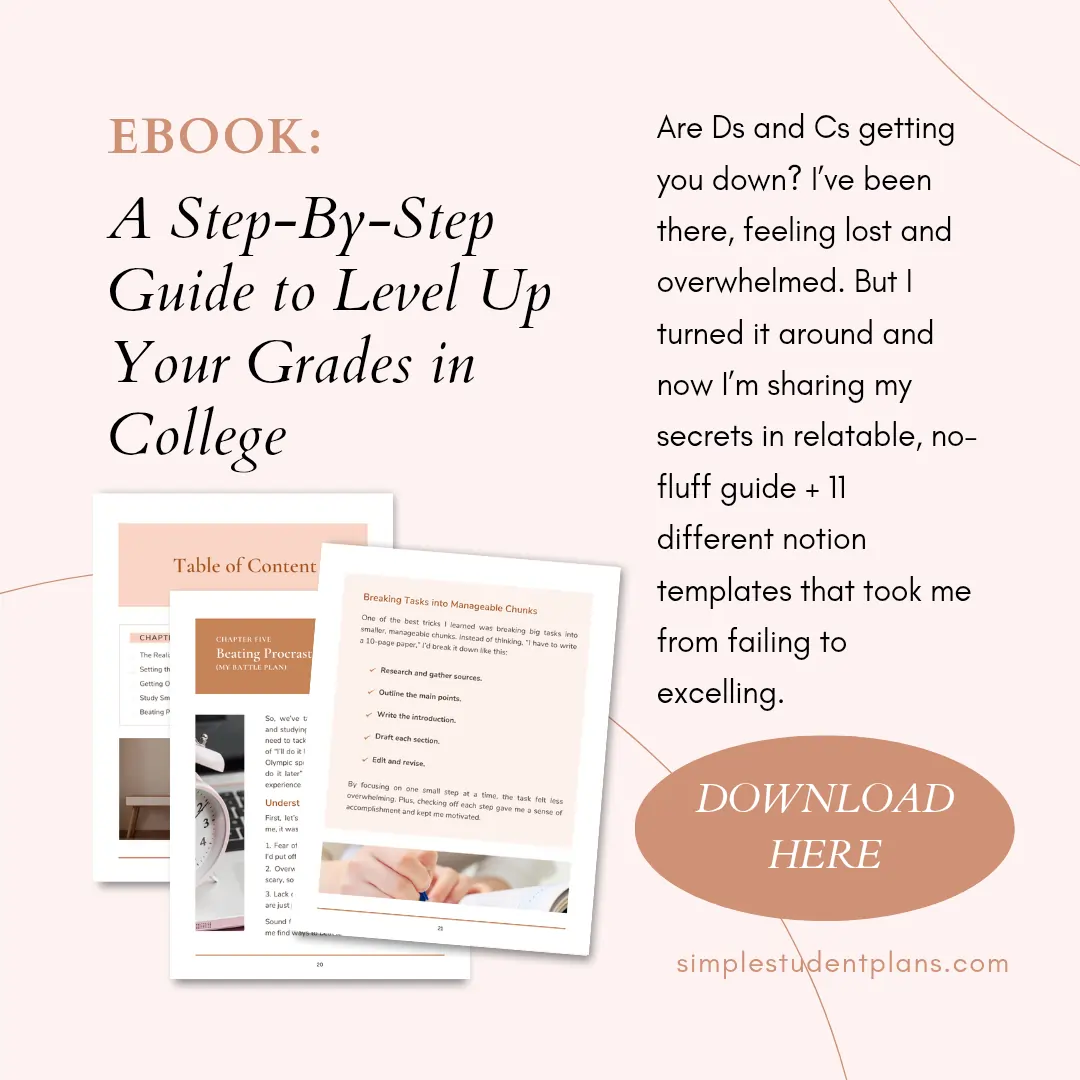If you’ve ever stared at your notes the night before an exam, panicked, and thought, “Why didn’t I start earlier?” — trust me, you’re not alone.
Exams can feel overwhelming, but the good news is that with the right exam preparation tips, you can study smarter (not harder) and save your GPA from crashing.
I’ll share 15 exam preparation tips that I’ve personally tried (and wish I’d known earlier in college). These tips are easy to follow and will help you walk into your exams more confident, less stressed, and way more prepared.
As an affiliate partner of various brands and sponsored content, SimpleStudentPlans may earn commission on qualifying purchases. Disclaimer | Advertise With Us
So grab your coffee, open your planner, and let’s dive into how to actually prepare for exams the right way.
Why Exam Preparation Matters
Exams can make or break your GPA. One bad grade might not seem like the end of the world, but if it keeps happening, it can drag down your average quickly.
The truth is, exam preparation isn’t just about passing, it’s about showing what you’ve learned, keeping your GPA healthy, and reducing stress.
When you prepare well:
- You save yourself from last-minute cramming.
- You retain information longer.
- You build confidence for the test.
- You protect your GPA (and your sanity).
Now let’s get into the practical stuff.
1. Start Early (Seriously, Don’t Wait)
I know it’s tempting to procrastinate, but starting early is the best exam prep hack ever. When you begin studying a week or two before exams, you can break things down into smaller chunks.
Instead of binge-studying 10 chapters in one night, you’ll only need to tackle a little each day. Trust me, your brain will thank you.
Pro tip: Use a study calendar. Write out which topics you’ll cover each day leading up to the exam. Even 30 minutes daily makes a huge difference.
2. Make a Study Schedule and Stick to It
Here’s something I learned the hard way: wishing you’ll study is not the same as actually studying.
Create a realistic study timetable. Block out specific hours for study sessions, breaks, meals, and even downtime.
Here’s an example of a 3-day exam countdown schedule:
| Time | Day 1 | Day 2 | Day 3 (Exam Day) |
|---|---|---|---|
| 9–11am | Review Lecture Notes | Practice Problems | Quick Revision |
| 12–1pm | Lunch/Break | Lunch/Break | Lunch/Break |
| 1–3pm | Flashcards & Quizzes | Mock Test | Review Key Terms |
| 4–6pm | Group Study | Revise Weak Areas | Relax & Light Reading |
| Evening | Chill/Exercise | Light Review | Sleep Early |
Scheduling helps you avoid wasting hours deciding “what should I study today?”
3. Find Your Best Study Environment
Some people study best in total silence, while others need a little background noise. Personally, I like a quiet corner in the library, but my roommate swears by coffee shops.
Experiment and figure out where you focus best. Then make that your go-to exam prep spot.
Avoid distractions: Turn off notifications or use apps like Forest or StayFocusd to stay off social media.
4. Use Active Recall Instead of Just Reading
Rereading notes feels productive, but it’s not the best way to retain information. Instead, use active recall—test yourself without looking at your notes.
Here’s how:
- Close your book and try to write down everything you remember.
- Quiz yourself with flashcards.
- Cover the answers and explain concepts out loud.
When you force your brain to remember information, you strengthen those memory connections.
5. Practice with Past Questions
If your professor provides past papers or sample questions, use them! They’re literally a sneak peek into the exam style.
When I first tried past questions, I realized how different the exam was compared to my notes. It helped me understand what areas to focus on and how to answer in the right format.
Tip: Even if you don’t have official past papers, create your own mock test by guessing what questions could come up.
6. Break Big Topics into Smaller Chunks
Staring at an entire textbook is intimidating. Instead, break topics into smaller, bite-sized chunks.
For example, instead of “Study Chapter 10,” write:
- Learn definitions in section 10.1
- Review examples in section 10.2
- Practice problems from 10.3
This makes studying less overwhelming and more manageable.
7. Use the Pomodoro Technique
Long study marathons can make you tired and unfocused. That’s where the Pomodoro Technique comes in:
- Study for 25 minutes.
- Take a 5-minute break.
- Repeat 4 times, then take a longer 15–30 minute break.
This method keeps you energized and prevents burnout.
8. Teach Someone Else
One of the best exam prep methods? Teach the material to someone else.
Grab a study buddy (or even your pet or a stuffed animal) and explain the topic in simple terms. If you can teach it clearly, you truly understand it.
I once explained a history chapter to my younger brother, and it stuck with me way better than just reading.

9. Use Visual Study Tools
Sometimes words just don’t cut it. Try using diagrams, charts, and mind maps to visualize concepts.
For example:
- Create flowcharts for processes.
- Use tables to compare theories.
- Draw mind maps to connect big ideas.
Visual aids help you see the bigger picture instead of memorizing random facts.
10. Prioritize Weak Areas First
It’s easy to spend hours on topics we already understand, but exams test everything. Focus first on the areas you struggle with.
Make a list of your weak topics and dedicate extra time to them. Once you’ve improved there, revise your stronger areas for reinforcement.
11. Form a Study Group (But Stay Focused)
Study groups can be powerful if done right. You can share notes, quiz each other, and explain tricky concepts.
Warning: Study groups can also turn into gossip sessions. Keep the group small (3–5 people) and set an agenda before meeting.
12. Stay Healthy While Studying
Your brain works better when your body is taken care of. During exam prep:
- Sleep well (don’t pull all-nighters).
- Eat brain foods like nuts, fruits, and whole grains.
- Stay hydrated—water > energy drinks.
- Move around (stretch or take a walk during breaks).
13. Use Technology Wisely
There are tons of apps and tools that can make exam prep easier:
- Quizlet for flashcards.
- Notion or Google Docs for organized notes.
- Grammarly for writing-based exams.
- Evernote for quick study notes.
If you’re into digital planners, you can also check out this student-friendly planner. Having a planner can seriously help you stay on top of study sessions.
14. Manage Stress Before Exams
Anxiety can ruin all your preparation. Learn how to calm your nerves before the big day:
- Take deep breaths.
- Meditate for 5 minutes.
- Avoid comparing yourself to others.
- Focus on progress, not perfection.
15. Review, Don’t Cram
Finally, the golden rule: don’t cram. The night before your exam, focus on light revision: flashcards, summaries, or key terms.
Cramming might work for a short quiz, but for big exams, you’ll forget half the stuff once you sit down. Stick to review, sleep early, and walk into the exam rested.
Key Takeaways
- Start early and create a study plan to avoid last-minute panic.
- Use active recall, past papers, and teaching others to truly understand material.
- Break topics into chunks, use visual tools, and focus on weak areas.
- Stay healthy with good sleep, diet, and stress management.
- Review lightly before the exam instead of cramming.
Your GPA depends on consistent, smart exam preparation, not stress-filled cramming.

FAQ: Exam Preparation
1. How many hours should I study for exams each day?
It depends on your schedule, but 2–4 focused hours per day in the week leading up to exams is usually enough if you start early. Quality matters more than quantity.
2. Is it better to study at night or in the morning?
It’s about your personal energy levels. If you’re a night owl, study in the evenings. If you’re a morning person, stick to mornings. Just avoid all-nighters.
3. How do I stop procrastinating while studying?
Break tasks into small goals, use the Pomodoro technique, and remove distractions (like your phone). Reward yourself after completing sessions.
4. Are study groups really helpful?
Yes—if they’re focused. Keep the group small and set goals before meeting to avoid wasting time.
5. What should I do the night before an exam?
Do light review, prepare your materials (ID, pens, calculator), and go to bed early. A rested brain performs way better than a tired one.
Final Thoughts
Exam preparation doesn’t have to feel impossible. With these 15 tips, you can prepare smartly, protect your GPA, and feel way more confident when exam day comes around. Remember, it’s not about how long you study, it’s about how effectively you study.
So, pick one tip to start today, set up your exam prep plan, and take control of your GPA!
